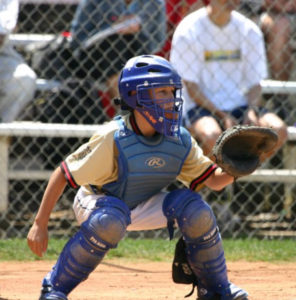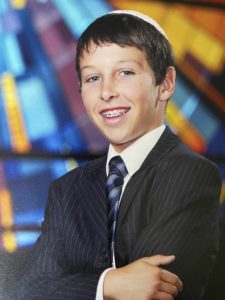
Baseball is a game that requires a level of discipline almost beyond a normal human’s capacity.
Day after day, year after year, even decade after decade, players rip swings in the cage, take balls in the field and play in yet another game in which they will fail to help their team score more often than not.
Garrett Stubbs, the new catcher for the Philadelphia Phillies, was drafted by the Houston Astros in 2015, reached the majors by 2019 and caught in the World Series last fall.
Stubbs has achieved a level of discipline that is almost beyond a normal human’s capacity.
And it was his bar mitzvah that taught him how to reach that level, he says.
“Working towards a goal at a young age in something other than sports or grades in school,” Stubbs explained.
Born in San Diego to a Jewish mother and a Catholic father, Stubbs, 28, was raised Jewish. He went to Hebrew school every Wednesday from age eight to 13. He celebrated his bar mitzvah at Temple Solel in Southern California with “a pretty big party,” as he remembered it.
And even after his bar mitzvah, Stubbs and his younger brother C.J. continued to attend services on High Holidays with their mother, Marti Jo Stubbs. Their father, T. Pat Stubbs, made the joint decision with his wife to raise the children Jewish.
Marti Jo Stubbs was not religious beyond High Holiday services and holiday meals, she explained. But it was important to her to raise her kids that way.

“The fact that the Jewish population is a minority. Trying to keep that alive,” she said. “The tradition, the culture.”
When the husband and wife were married, a rabbi officiated. He told T. Pat Stubbs that he wanted him to be a friend of the Jewish people.
“We kind of started with that foundation,” Marti Jo Stubbs said.
And later on, it shaped their oldest son. During his bar mitzvah process, he was, as you might expect for a future big leaguer, an active travel baseball player.
Each Sunday, he would go to religious school in the morning in uniform, then go straight to his game. If he had an earlier game, he would hustle back for a later session of Hebrew school.
Early in life, the Jewish baseball standout learned what it took to work toward goals, handle a busy schedule and manage different, but equally important, priorities. You could even say the process made him a man.
At his Hawaiian-themed bar mitzvah party, before most of his friends, Stubbs’ parents spoke about how proud they were of their oldest son.
“Just that discipline of doing something every single week and then getting to accomplish that was definitely a stepping stone,” Stubbs said.
Stubbs did not have a lot of Jewish friends growing up, and his Christian friends only really practiced on Easter and Christmas, he said. So in preparing for his big day, he was on his own.
Yet in hindsight, Stubbs appreciates it. The 28-year-old is not married and does not have kids. But if he builds a family of his own one day, he wants to emulate his mother and pass down Judaism to his children.
“That’s important to me. I like the Jewish religion,” he said. “There is just a sense of community.”
At the moment, though, Stubbs does not practice much. A peripatetic baseball journey has a way of forcing you to focus on almost nothing else.
Stubbs was a standout high school player in Southern California and then a college player at the University of Southern California, winning the Johnny Bench Award as the nation’s best catcher after his senior season. He got drafted in the eighth round by the Astros and began the obscure minor league journey that kills many a big league dream.
But the catcher stuck it out through stints in Lancaster, California; Corpus Christi, Texas; and other minor league towns. Finally, in 2019, he reached the majors — only to spend the next three seasons bouncing back and forth between the Astros and the farm system.
In 2021, though, with Houston short a catcher due to COVID, he came back up for game four of the World Series against the Atlanta Braves and got to play. Stubbs’ appearance helped make the ’21 series the most Jewish in history, with Astros’ third baseman Alex Bregman, Atlanta pitcher Max Fried and Braves’ outfielder Joc Pederson all representing the tribe.
Atlanta beat Houston four games to two as Fried pitched six scoreless innings in game six to earn the win. Bregman and Pederson both struggled in the series, hitting under .100, while Stubbs did not get a chance to bat.
The catcher was well aware of the Jewish history he was a part of during the series.

“Last year was a cool moment,” he said.
Stubbs, like many Jews, is aware of the tribe’s long history of success in the national pastime.
Bregman is an All-Star and Silver Slugger Award winner as the best hitter at his position. Fried is one of the better pitchers in the league, with a 43-20 career record and a 3.32 career earned run average.
Former Milwaukee Brewers slugger Ryan Braun, who played from 2007-2020, was a six-time All-Star and the National League’s Most Valuable Player in 2011. Two other Jewish players from Braun’s era, Ian Kinsler and Kevin Youkilis, were multiple-time All-Stars.
And one day, Braun might join Los Angeles Dodgers legend Sandy Koufax and Detroit Tigers slugger Hank Greenberg in the National Baseball Hall of Fame and Museum in Cooperstown, New York.
“We’ve had some very strong representation throughout the years,” said Jed Margolis, the chairman of the International Jewish Sports Hall of Fame. “The list is really continued.”
Margolis called the history a source of pride for Jews. He follows the Jewish players closely and believes they help buck the stereotype that Jews are not athletes.
“It helps overcome that antisemitism,” he said.
Stubbs feels that same sense of pride from Jewish fans in Philadelphia.
The catcher came to Philadelphia in the offseason through a trade for a minor leaguer; the Phillies needed a backup for All-Star starter J.T. Realmuto. Over more than a month of play and 35 games, the 28-year-old has only played in eight.
And on a team with big names like Bryce Harper, Rhys Hoskins and Kyle Schwarber, among others, Stubbs is not one of the more noticeable players at the ballpark or on television. Yet in a city with one of the biggest Jewish populations in the country, Jewish fans never seem to fail to notice him, he says.
When he’s on the field, people will yell out his name from the stands. This happens to players a lot, Stubbs explains, but a lot of times when Jewish fans do it, they will tell him they’re Jewish, and he’ll turn around.
“Every once in a while they’ll say, ‘Garrett, Garrett, Garrett! I’m part of the Jewish community, too!’” he said. “It’s cool. It’s great.”

So far, with his Jewish fans at his back, the catcher is having a pretty nice season. In 22 plate appearances, he is hitting a solid .350 with a .409 on-base percentage. He also has no errors behind the plate.
Right now, Stubbs is just happy to be here. He said he enjoys learning his position from Realmuto, who he calls “the best catcher in the big leagues.”
The 28-year-old is catching bullpens each day and taking cuts in the cage, trying to stay ready for when the team needs him. He also believes that the Phillies, who are hovering around the .500 mark, are talented enough to turn their season around.
“We just haven’t really clicked as a team,” he said. “We have a lot of really good players.” JE






